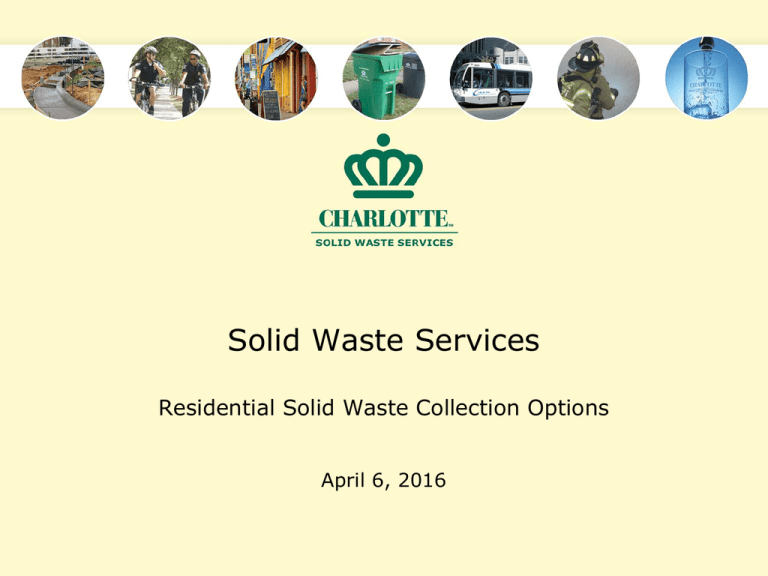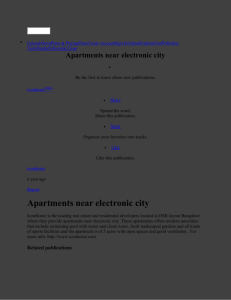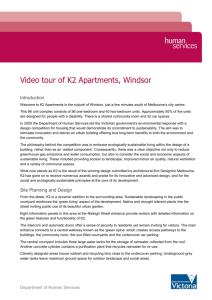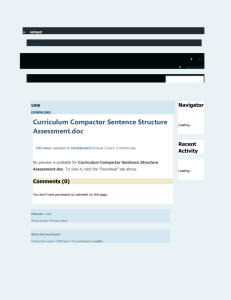Solid Waste Services Residential Solid Waste Collection Options April 6, 2016
advertisement

Solid Waste Services Residential Solid Waste Collection Options April 6, 2016 Overview • Policy Question • Options with pros and cons • Next Steps 2 Policy Question Are apartment buildings commercial entities that should handle waste collection independently? 3 Current Policy • Solid Waste Services provides collection services for: – Single family residential – Multi-family residential (townhomes & condos) – Multi-family commercial (apartments) • Collection methods include: – Roll out service (single family, multi-family < 30 units) – Contracted Dumpster/Compactor (multi-family > 30 units) 4 Current Model Multi-Family Unit Type Units Apartment 102,878 3,958 98,920 24,122 6,079 18,043 8,969 6,313 2,656 Condo Townhouse Unknown Total Single Family Homes Roll Out Dumpster/ Compactor Private Hauler 15,587 151,556 Units 197,670 15,587 16,350 Roll Out 119,619 Dumpster/ Compactor 15,587 Private Hauler 197,670 Anticipated increase of 5-10% in multi-family units in FY2017 and FY2018 5 Basis for new options for apartments • From Tax Assessor’s Office – Multi-Family is a classification of housing where multiple separate housing units for residential purposes are contained within one building. Most of the time these are properties such as apartments, duplexes, triplexes etc. – Apartments are considered commercial projects by our office. The commercial real estate division is responsible for those valuations. • Solid waste management is a residential service in most municipalities • Collecting commercial solid waste without full cost recovery is unique to Charlotte based on review of peer cities 6 Options for Consideration 1. Stop solid waste services to multi-family commercial buildings (i.e., apartments) 2. Full Cost Recovery for solid waste services to multi-family commercial buildings 3. Franchise solid waste services to multi-family commercial buildings 4. Continue providing services in current form 7 1. Stop Service How would it work? • Apartments, as commercial entities, would use the free market for waste collection services. Pros • Eliminates subsidy to commercial buildings • Increased market competition • Improved alignment between SWS service provision and Tax Office property classification Cons • Potential impact on rents • Potential impact on recycling • Potential for multiple haulers and collection days Impacted Units 98,920 3,958 Service Type Dumpster/Compactor Rollout Net Savings/ Cost Avoidance $2.0M - $2.5M $104,000 8 2. Full Cost Recovery How would it work? • Apartments, as commercial entities, would be billed a solid waste fee equal to the cost of waste collection incurred by Solid Waste Services. Pros • Eliminates subsidy to commercial buildings • Cost control for apartment owners/renters • Improved alignment between SWS service provision, Tax Office property classification, and small business solid waste services Cons • Potential impact on rents Impacted Units Service Type 98,920 Dumpster/Compactor 3,958 Rollout Estimated Unit Cost Current SW Fee Revenue $59 $2,473,000 $195 $98,950 Estimated Additional Revenue $3,363,280 $672,860 9 3. Franchise Model How would it work? • A contracted arrangement for one or more haulers to provide service for group designated by the City at competitive rates. Service users pay the haulers directly. Pros • Cost control for apartments/renters • Limits number of haulers and collection days Cons • Possible limited opportunities for small haulers • Possible enforcement, inspection, monitoring Impacted Units 98,920 3,958 Service Type Dumpster/Compactor Rollout Net Savings/ Cost Avoidance $2.0M - $2.5M $104,000 10 4. Continue Current Service How would it work? • No change to current services or fees. Pros • No change in service Cons • Continued taxpayer subsidy for commercial buildings • Continued misalignment between SWS service provision and Tax Office property classification • Budget impact from continued growth of apartments Unit Count Service Type 119,619 Dumpster/ Compactor FY16 Projected Full Cost FY17 Projected Full Cost FY18 Projected Full Cost $5.3M $6.2M $6.7M - $7.7M 11 Next Steps • Get feedback from Council on options • Schedule Public Forum #3 to update residents • Incorporate into Manager’s Recommended FY2017 Budget (as needed) 12





